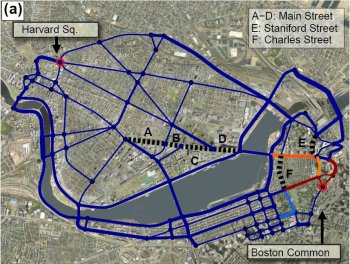Dept. of Physics, KAIST, Daejeon, Korea.
Uncoordinated individuals in human society pursuing their personally optimal strategies do not always achieve the social optimum, the most beneficial state to the society as a whole. Instead, strategies form Nash equilibria, which are, in general, socially suboptimal. Society, therefore, has to pay a price of anarchy for the lack of coordination among its members, which is often difficult to quantify in engineering, economics and policymaking. Here, we report on an assessment of this price of anarchy by analyzing the road networks of Boston, New York, and London as well as complex model networks, where one’s travel time serves as the relevant cost to be minimized. Our simulation shows that uncoordinated drivers possibly spend up to 30% more time than they would in socially optimal traffic, which leaves substantial room for improvement. Counterintuitively, simply blocking certain streets can partially improve the traffic condition to a measurable extent based on our result.
One-sentence summaries: Traffic in transportation networks – often substantially suboptimal due to a lack of coordination among users – can be guided to the social optimum without directly controlling individual behavior by adjusting the underlying network structure appropriately.
